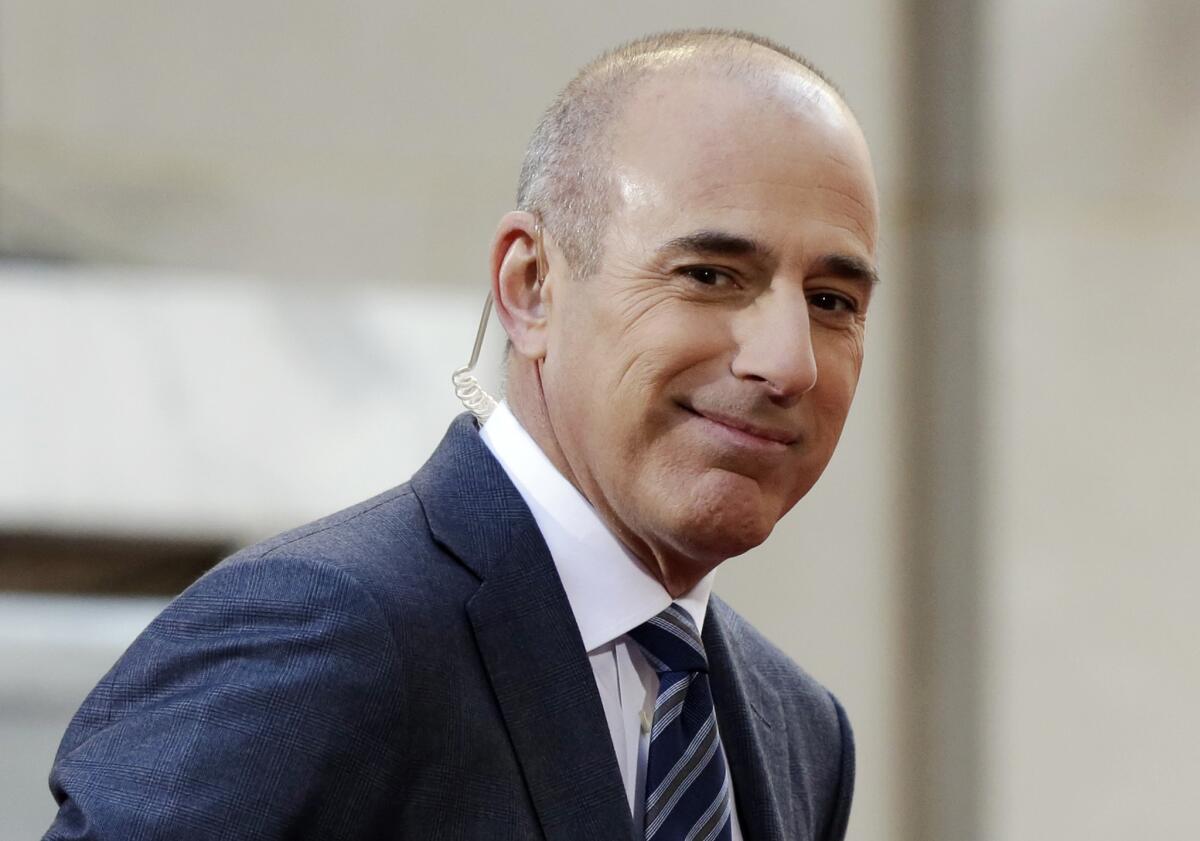Ronan Farrow’s critics are circling. Here’s what you should know about his media war
- Share via
Investigative journalist Ronan Farrow, author of the hit 2019 book “Catch and Kill: Lies, Spies, and a Conspiracy to Protect Predators,” has come under scrutiny this week after the New York Times published a scathing critique of his Pulitzer Prize-winning methods.
On Sunday, New York Times media columnist Ben Smith pondered, “Is Ronan Farrow Too Good to Be True?,” characterizing Farrow’s renowned reporting as flawed and self-serving “resistance journalism.”
The column focuses in part on “Catch and Kill,” which explores Farrow’s investigation into convicted rapist Harvey Weinstein, as well as plots allegedly waged by Weinstein and NBC to bury Farrow’s findings.
Smith’s Sunday criticism of Farrow quickly caused a stir on social media, prompting responses from Farrow, New Yorker staffers, Weinstein accuser Ambra Battilana Gutierrez and even former “Today” show anchor Matt Lauer, who dismissed a rape allegation leveled against him in “Catch and Kill.”
Everyone wondered how Harvey Weinstein allegedly got away with it for so long; Ronan Farrow has some of the answers in “Catch and Kill,” and they are not pretty.
As the son of actress Mia Farrow and divisive director Woody Allen, Farrow, 32, was already born into fame before his influential journalism made him a household name — a rare feat in an industry that doesn’t boast many nonbroadcast stars.
Farrow’s 2017 New Yorker piece at the center of “Catch and Kill,” titled “From Aggressive Overtures to Sexual Assault: Harvey Weinstein’s Accusers Tell Their Stories,” helped propel the #MeToo movement forward and won Farrow the Pulitzer Prize for Public Service, shared with the New York Times’ Jodi Kantor and Megan Twohey for their reporting on Weinstein.
In his takedown of the “rare celebrity-journalist,” Smith also referenced Farrow’s bombshell exposé on President Trump’s personal attorney, Michael Cohen, and speculated that Farrow might be “the most famous investigative reporter in America.”
Here’s a summary of what went down in the media frenzy.
Smith comes for Farrow
While Smith praised Farrow’s “ability to shine a light on some of the defining stories of our time,” he also called the reporter’s watchdog approach “misleading,” warning of a “dangerous” and inherent “weakness of a kind of resistance journalism” that trades hard facts for drama.
“If you scratch at Mr. Farrow’s reporting in The New Yorker and in his 2019 best seller, ‘Catch and Kill: Lies, Spies, and a Conspiracy to Protect Predators,’ you start to see some shakiness at its foundation,” Smith wrote in his May 17 column. “He delivers narratives that are irresistibly cinematic — with unmistakable heroes and villains — and often omits the complicating facts and inconvenient details that may make them less dramatic.
“At times, he does not always follow the typical journalistic imperatives of corroboration and rigorous disclosure, or he suggests conspiracies that are tantalizing but he cannot prove.”
The piece went on to suggest that Farrow failed to corroborate key allegations of rape against both Weinstein and Lauer, who was fired from his post at NBC in 2017 after multiple women publicly accused him of sexual misconduct.
Smith also poked holes in Farrow’s “Catch and Kill” claim that NBC buried his Weinstein story after getting blackmailed by Weinstein, who allegedly threatened to expose the not-yet-public accusations against Lauer.
NBC denies Farrow allegations that it paid off employees who said they were harassed by fired “Today” host Matt Lauer.
NBC has denied killing Farrow’s Weinstein story to protect Lauer, instead claiming that Farrow’s reporting at the time did not meet the network’s standard for publication.
“In Mr. Farrow’s telling, by the end of July 2017, he had nailed down the story of Mr. Weinstein’s pattern of sexual predation, and the NBC brass had begun to shut him down,” Smith wrote in his latest column. “He has said repeatedly that he had at least two women on the record for his story at the time he left NBC for The New Yorker.
“But NBC has disputed that claim, and an NBC employee showed me what he described as the final draft of Mr. Farrow’s script, as of Aug. 7. It had no on-the-record, on-camera interviews.”
The New Yorker defends Farrow
After Smith’s critique started to pick up viral steam, New Yorker editor Michael Luo rushed to his writer’s defense Monday via a lengthy Twitter thread accusing Smith of omitting “detailed responses” from the New Yorker “that contradict the narrative he wants to tell.”
(Smith’s column does include comments from a couple New Yorker staffers, including editor David Remnick, who called Farrow’s work “scrupulous, tireless, and, above all, fair,” and writer Ken Auletta, who argued that Farrow “delivered the goods.”)
“We take corrections seriously and would be happy to correct something if it were shown to be wrong. But Ben has not done that here,” Luo tweeted after refuting several specific claims from Smith’s column. “We are proud of [Farrow’s] reporting, and we stand by it.”
Farrow defends himself
Citing Luo’s 16-part thread, Farrow tweeted “a few additional thoughts” Monday on Smith’s remarks.
“Ben claims a central theme [in ‘Catch and Kill’] was whether Weinstein threatened NBC with Lauer info,” Farrow wrote in his own thread. “Not central, and not what the book says. The book establishes a pressure campaign against NBC, including talks between Weinstein and executives as they told me and my producer to stop reporting.
“As to whether Lauer information was one of the many levers used, the book accurately describes the sources at [American Media Inc.] and NBC who say so, and NBC’s contention that it wasn’t. The book doesn’t go beyond what the reporting revealed.”
Farrow also disputed some other claims in Smith’s piece, adding, “I stand by my reporting.”
‘We’re so great, we may have broken journalism,’ says the New York Times’ new media columnist.
Weinstein accuser Gutierrez speaks out
Weinstein accuser and Filipino Italian model Gutierrez called Smith out on Monday for excluding her name from his New York Times essay.
“I’m tired of being written about without being named,” Gutierrez said in response to a tweet from writer Laurence Pevsner, which noted that, “In his [Farrow] piece, [Smith] refers to [Gutierrez] as an ‘Italian model’ while he lists white survivors by name (like Lucia Evans) ... Why does [NYT] keep erasing the one woman of color from this story?”
In his column, Smith admits that Farrow’s original NBC investigation into Weinstein “did have one strong piece of reporting that Mr. Farrow took to The New Yorker: an audio recording of Mr. Weinstein appearing to confess to an Italian model that he had groped her.”
Smith has not responded to Gutierrez’s criticism.
Lauer attacks Farrow
In an unexpected twist, ousted NBC anchor Lauer piggybacked on Smith’s buzzy column with his own 4,800-word critique, published Tuesday on Mediaite with the headline: “Why Ronan Farrow Is Indeed Too Good to Be True.”

Lauer doubled down on his denial that he allegedly raped former NBC employee Brooke Nevils, as outlined in “Catch and Kill.” Lauer previously disputed Nevils’ rape account prior to the book’s publication in 2019.
Lauer also accused Farrow of harboring bias against NBC after the “Catch and Kill” author left the network in 2017.
“I am not suggesting that everything Ronan has written in his book is untrue or based on misinformation, but it is clear that over the course of nearly two years he became a magnet and a willing ear for anyone with negative stories about the network and people who worked for it,” Lauer wrote in his Mediaite column.
Nevils and Farrow dismiss Lauer
Likely reacting Tuesday to Lauer’s latest attempt to invalidate her rape claim, Nevils simply tweeted, “DARVO: Deny, Attack, Reverse Victim and Offender.”
The acronym, coined by psychologist Jennifer Freyd, breaks down the stages of a predator’s response to sexual misconduct allegations, resulting in the offender recasting himself as the victim and vice versa.
Farrow also addressed the disgraced broadcast journalist’s essay Tuesday on Twitter, writing: “All I’ll say on this is that Matt Lauer is just wrong.”
“Catch and Kill was thoroughly reported and fact-checked, including with Matt Lauer himself.”
More to Read
Sign up for our Book Club newsletter
Get the latest news, events and more from the Los Angeles Times Book Club, and help us get L.A. reading and talking.
You may occasionally receive promotional content from the Los Angeles Times.










